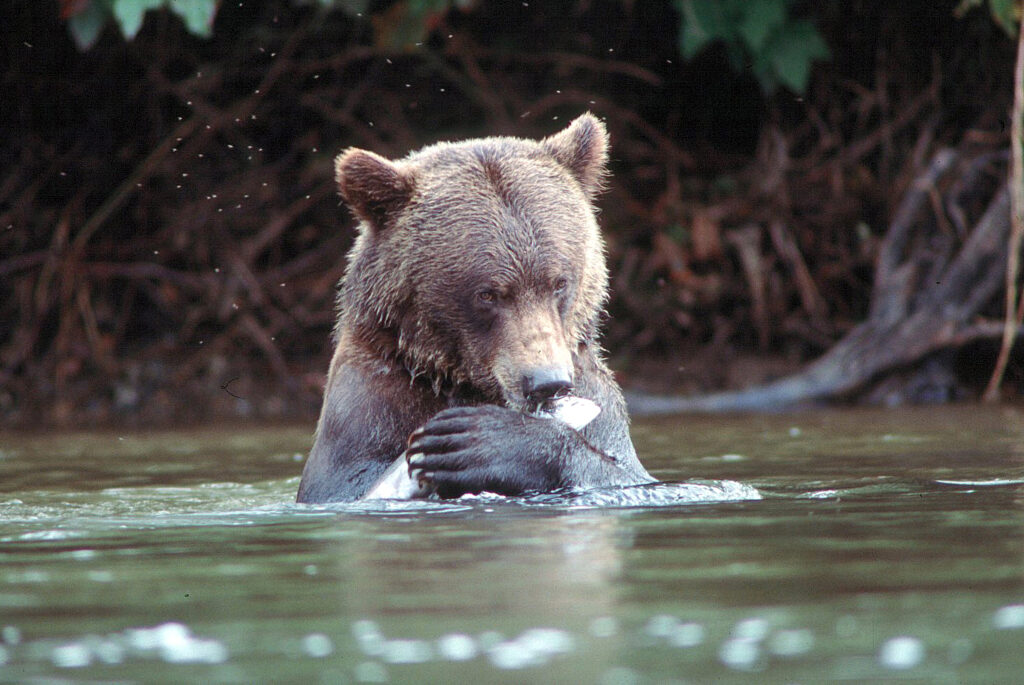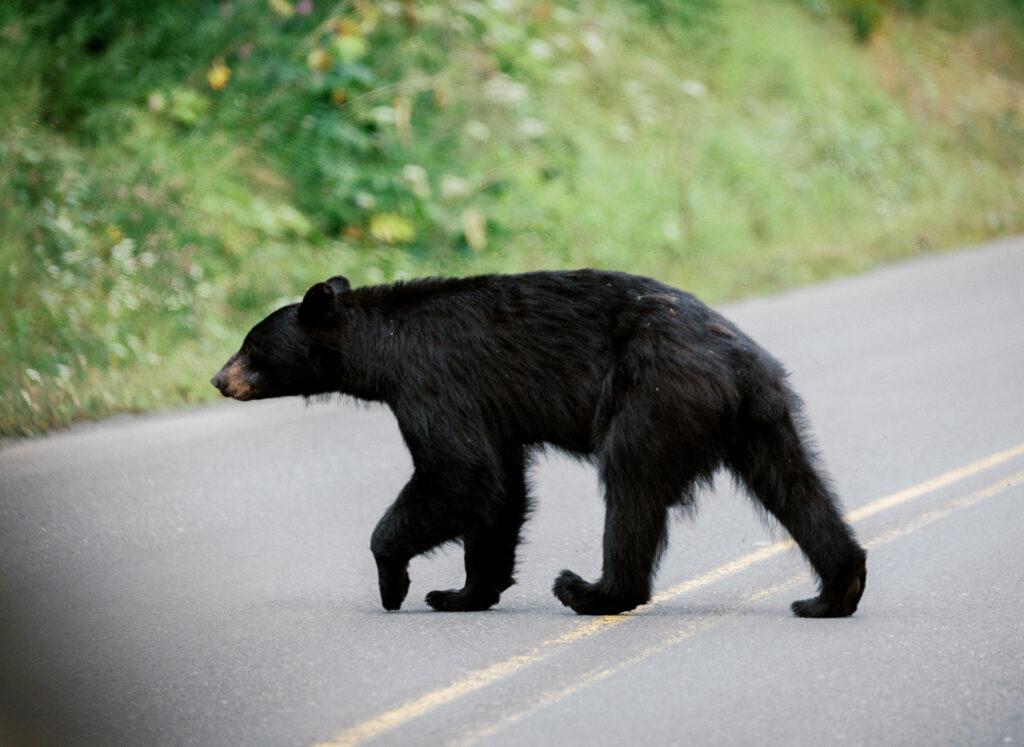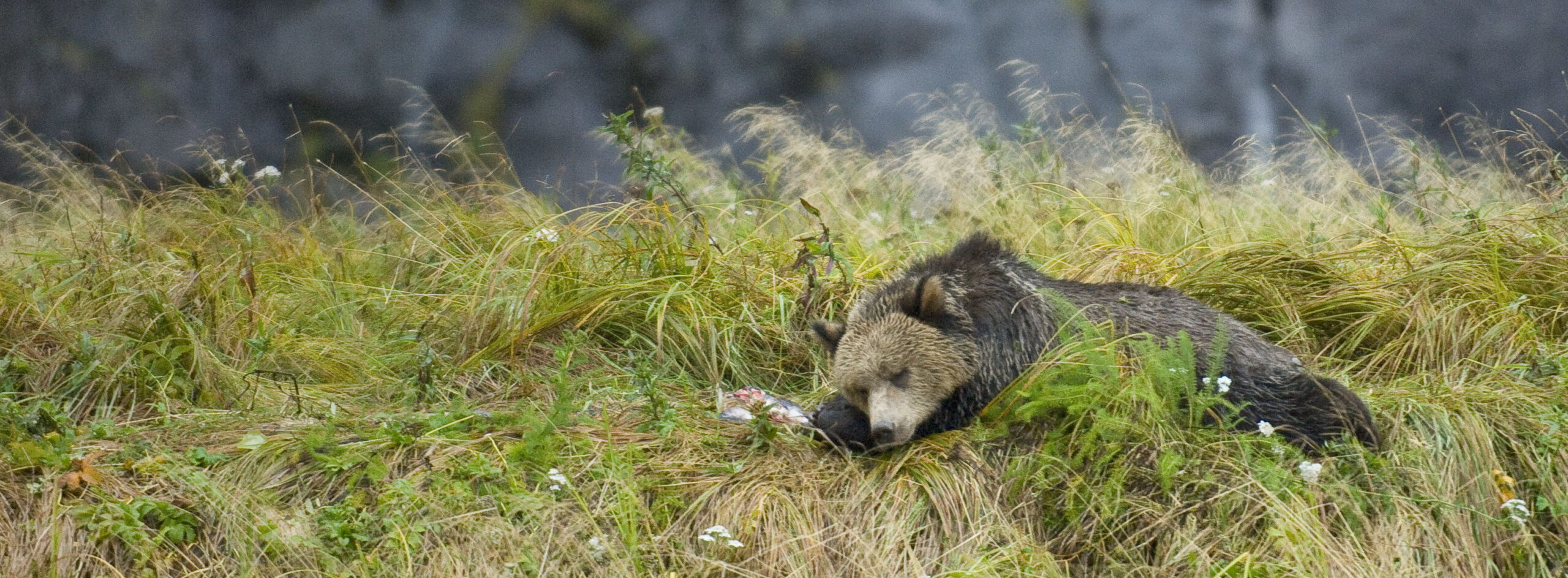You have probably heard about hibernation, but what is hyperphagia? This term means intense eating, and is a phase that bears go through in the fall to increase their body weight and prepare for winter denning. Bears need to increase their body weight by approximately 30% in order to have enough energy stores to survive winter denning.
As the fall progresses bears may move to lower elevations where there is still lush greenery to snack on. These lower elevations are where many of our communities in BC lay, which means an increased chance of conflicts with bears this time of year.
This year, with severe drought and fires, bears may have an extra hard time finding food. Conservation Officers are warning that bears could be displaced by fires, and that attractants, like garbage, could further increase the potential for conflicts.

Bears have an excellent sense of smell which they use to guide them to food sources. This can also lead them straight into towns if attractants are present. Access to unnatural food sources like garbage, domestic fruit trees and even bird seed can lead to bears becoming food conditioned and/or habituated to humans. This can result in unsafe situations for both bears and people.
People have an important role to play as wildlife stewards. You can help keep bears safe and your neighbourhood free from bear conflicts by practising attractant management. Our friends from WildSafeBC have a Top 10 List you can use to keep bears wild and your community safe!
WildSafeBC’s Top 10 Tips:
- Keep your garbage secure – store it indoors, in a secure shed, or in a bear-resistant enclosure.
- Only put your garbage/yard waste/recyclables out on collection day – never the night before.
- Manage your fruit trees so that fruit is picked as it ripens, and no windfall accumulates.
- Bring bird feeders in from April through November – and when they are out, ensure that the ground underneath is kept free of seeds.
- Feed pets indoors.
- Maintain your compost so that it doesn’t smell. Add fruit slowly. Never add meat or dairy.
- Protect fruit trees, beehives and small livestock with properly installed & maintained electric fence.
- Respect wild animals by not feeding them. Food-conditioned wildlife are more likely to come into conflict.
- Keep barbecues clean and odour free.
- Report any wildlife in conflict or bear, cougar, coyote or wolf sightings in the community to the Conservation Officer Service 24/7 at 1-877-952-7277.
Most encounters can be prevented by:
- making noise
- travelling in groups
- keeping pets on a leash, and;
- avoiding areas where there are signs of recent wildlife activity such as scat.
If you do encounter a bear, stop, try to stay calm and do not run!
- Back away slowly from the bear and talk to it in a calm, firm voice to signal that you are not a threat, nor a typical animal they would prey on.
- Be sure to have bear spray accessible, like carried on a hip holster, and know how to use it. Bear spray is a low-cost and lightweight option to stop a bear attack.
- In the unlikely event a bear charges or is exhibiting stalking behaviour, stand your ground and use your bear spray.
Wildlife in BC’s Parks
Wildlife stewardship starts with managing attractants around your home, and extends into responsible recreation when you visit parks and natural areas. Always be prepared for wildlife encounters, carry bear spray, and be sure to give wildlife plenty of space.
One of the best ways we can support bear conservation is by protecting their habitat. Bears require large and connected habitats to thrive.
Large natural areas allow bears to meet all their seasonal food requirements. In the spring they need protein rich green shoots that first appear at lower elevations, to help build back muscle after winter denning. In the summer, they need berry rich slopes and meadows. And in the fall, salmon bearing streams offer a critical food source so bears can build up their winter fat stores.
Bears bring the salmon into the forest to eat, where the remains decompose and provide essential soil nutrients that help the trees grow. This helps make bears a keystone species, as they have a major role in healthy BC ecosystems.
Protecting habitat for bears is important to ensure they have enough sources of nutritious food, and reduces their risk of conflict in urban spaces. The goal to protect 30% of land in BC by 2030, will be important for bear conservation and ensuring healthy, functioning ecosystems in BC.

Sadly, a dead grizzly, killed illegally, was found recently in the Squamish River. Conservation Officers are asking for information about this incident, which can be reported to the RAPP line: 1-877-952-7277. Wildlife conflicts or people feeding bears can also be reported to this number.
